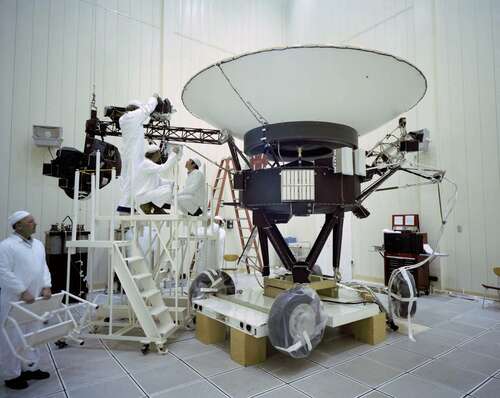NASA revealed that its interstellar Voyager 1 spacecraft has encountered a significant problem.
This legendary Voyager probe — which has traveled farther than any other craft — can acquire messages from Earth, but a computer glitch has hindered Voyager from transmitting vital information.
“As a result, no science or engineering data is being sent back to Earth,” the space agency explained in a blog.
There’s no quick fix. NASA engineers have tried resetting the afflicted computer, called the flight data system (FDS), but it still sends back the same repeating pattern of software code. “It could take several weeks for engineers to evolve a new scheme to treat the issue,” the agency explained.
Engineers can’t simply just send it new commands and see if that rectifies the problem. That could make matters worse.
“Finding solutions to challenges the probes confront often entails consulting original, decades-old documents written by engineers who didn’t foresee the issues that are arising today,” NASA said. “As a result, it takes time for the team to comprehend how a new command will affect the spacecraft’s operations in order to avoid unintended consequences.”

NASA engineers working on the Voyager 2 spacecraft in 1977.
Credit: NASA / JPL-Caltech
The good news is that NASA’s Voyager engineers have proven excellent at repeatedly troubleshooting spacecraft problems. It just requires patience. After all, Voyager 1 (and its sibling, Voyager 2), are approaching 50 years old. And at billions of miles away in deep space, it takes over 22 hours just to beam a message to Voyager 1.
Want more science and tech news delivered straight to your inbox? Sign up for Mashable’s Light Speed newsletter today.
Both craft, launched in 1977, are still performing important research. They’re returning data about the radiation in interstellar space and how far the sun’s protective bubble of energy and particles extends into the cosmos.
“The science data that the Voyagers are returning gets more valuable the farther away from the sun they go, so we are definitely interested in keeping as many science instruments operating as long as possible,” Linda Spilker, Voyager’s project scientist, said earlier this year.
If NASA keeps both spacecraft functioning, they have enough fuel to transmit back data for around another decade, through the mid-2030s.

